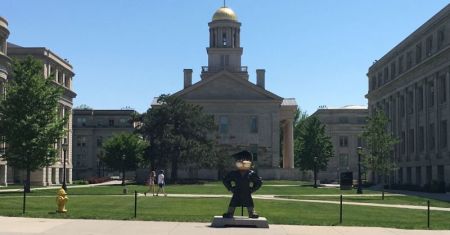University cannot force InterVarsity to have non-Christian leaders, court rules

A federal judge has ruled that the University of Iowa cannot force its InterVarsity Christian Fellowship chapter to allow for non-Christian student leaders.
U.S. District Court Judge Stephanie M. Rose issued a ruling last Friday that allowed for InterVarsity to continue to choose its leadership based on religious parameters rather than conform to the University’s anti-discrimination policy, known as the Human Rights Policy.
The ruling stipulated that the University “may not enforce the University’s Human Rights Policy against InterVarsity based on the content of InterVarsity’s leadership selection policies.”
This came under the conditions that the University continues to unevenly apply their policy to recognized student groups, that InterVarsity does not change its rules for leadership or statement of faith, and that InterVarsity “otherwise maintains its eligibility for [recognized student organization] status.”
“… university nondiscrimination policies are not viewpoint neutral if they are selectively applied to restrict the leadership and/or membership requirements of some student groups but not others,” wrote Judge Rose.
“The RSO Policy, on its face, exempts fraternities and sororities from the Human Rights Policy so they may speak about gender … Some groups, such as Love Works, Zeta Beta Tau, and Pi Kappa Phi, can express their views on religion. This disparate treatment constitutes viewpoint discrimination against InterVarsity.”
Rose drew upon a previous ruling against the University in a lawsuit brought by the Christian student group Business Leaders in Christ.
In February, Rose ruled that the University could not enforce its human rights policy against BLinC when the group did not allow a homosexual student to become a leader due to his opposition to the group’s religious views on marriage and sexuality.
At issues was that the policy was not being imposed upon other recognized student organizations at Iowa, according to the federal court.
“Ultimately, the Court granted BLinC summary judgment on its First Amendment free speech, free association, and free exercise claims,” she ruled earlier this year.
“In both cases, the plaintiffs’ claims have turned on the University’s uneven enforcement of the Human Rights Policy against RSOs.”
Becket, a religious liberty law firm that helped to represent InterVarsity, celebrated the ruling yet also bemoaned how it was only the most recent litigation of this kind against the University.
“It’s too bad it took twice for the University to learn its lesson,” said Daniel Blomberg, senior counsel at Becket, in a statement released Monday.
“There was no excuse the first time for squashing students’ First Amendment rights. University officials nationwide should now take note that religious discrimination will hit them in the pocketbook.”






















